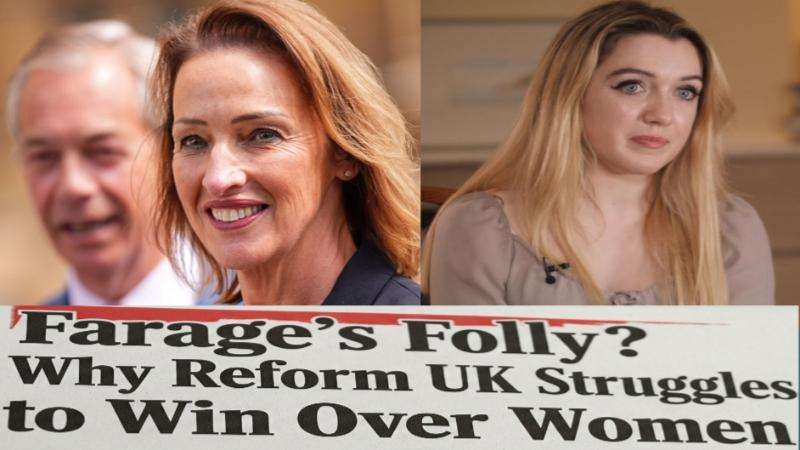Reform UK is on the march, having delivered a barnstorming performance in this year's local elections and becoming the most successful political party on TikTok. Yet, despite this surge, a significant gender gap persists, with the party struggling to resonate with women. While their TikTok following boasts 400,000 followers, the vast majority are men. This disparity raises a critical question: Why don't women like Reform UK, and can the party truly broaden its appeal without addressing its image problem?
A Long-Standing Image Problem
For years, Reform UK, and its previous iterations, have grappled with an image that has scuppered efforts to bring women into the fold. This was evident even at their ambitious local elections launch in March, where finding young women among the supporters was a challenge. As one female supporter noted, "Now you say it, there are more men here," yet she remained optimistic that "We'll get the women in."
The initial approach to candidate selection for the general election reflected this imbalance. Fewer than 20% of Reform's general election candidates were women. Furthermore, the five men elected as MPs were all white with a median age of 60, painting a picture of a less diverse political offering.
Polling consistently highlights this gender divide. According to a YouGov survey from June 2025, young women are one of Reform UK's weakest demographics, with only 7% supporting the party – half the rate of men in the same age group. Conversely, support is highest among older men, with nearly 40% of over-65s backing Reform.
Trust Issues: Farage, Controversy, and Vetting Failures
A key factor contributing to women's distrust in Reform UK, and by extension Nigel Farage, stems from a series of controversies and perceived vetting failures within the party.
The call for the party to "professionalise" by Nigel Farage at Reform's September conference last year underscored an acknowledged issue. Farage himself admitted to Sky News that "no vetting" had occurred for one of their new MPs, James McMurdock. Only a couple of months after his election, it was revealed McMurdock had been jailed in 2006 for assaulting his then-girlfriend. While McMurdock has since suspended himself from the party over unrelated allegations about his business affairs (which he denies), this incident highlighted a concerning lack of due diligence.
Further damaging the party's image were "credible" allegations of bullying and harassment by Rupert Lowe, another of Reform's original MPs, and his team, as outlined in a report by a KC hired by the party. Lowe has denied all wrongdoing and is now an independent MP, claiming the accusations were retaliation after he criticised Farage. These incidents, regardless of their outcome, have created a perception of a party with internal issues that could deter women.
Nigel Farage himself has also courted controversy. He previously dismissed gender disparities in business as a result of men being more willing to “sacrifice family lives.” He has also praised controversial far-right influencer Andrew Tate, who was later charged with rape, as an “important voice” for “emasculated” men. Furthermore, Reform UK's manifesto includes a pledge to scrap the UK's Equality Act, legislation designed to prohibit discrimination based on gender, disability, race, and more. These stances and associations could be off-putting to many women voters.
Recent Shifts and a Targeted Strategy
Despite these historical hurdles, Reform UK has made concerted efforts to appeal to women, particularly in the run-up to the May local elections.
A significant breakthrough came with the by-election in Runcorn and Helsby, where Sarah Pochin secured Reform's first female MP, winning by a narrow margin of six votes. This victory saw Reform effectively double their vote share in the constituency, jumping to 38% compared to the general election. In the Lincolnshire mayoral race, Andrea Jenkyns, a former Conservative MP who defected to Reform, won with a commanding 42% of the vote, becoming Greater Lincolnshire's first mayor.
The local election results overall were positive for Reform, with the party gaining control of 10 local authorities and winning 677 seats, amounting to 41% of all seats up for election. This success brought new recruits into the party, including some who had no prior active political involvement.
Reform's strategy is now increasingly focusing on "hyper-localism," with candidates like Catherine Becker, a Reform councillor, emphasizing local issues such as crime, family, and law and order. Catherine, a mother, states that "motherhood, family, and community is at the heart of Reform's offering," attracting her to what she calls their "common sense" policies.
The party has also pivoted to speaking on controversial topics they believe resonate with women voters. Anna McGovern, a defector from the Conservative Party, notes that "Reform are speaking up for women on issues such as transgenderism, defining what a woman is." The increased mention of "grooming gangs" in the Commons by Reform MPs since their initial five entered parliament (159 times compared to 88 in the preceding 13 years) also highlights this focus.
This targeted approach appears to be having some effect. According to Luke Tryl, Executive Director of the More In Common polling firm, while the gender divide in right-wing parties remains stark, Reform's newer converts are increasingly female. His focus groups indicate that the party's vote share among women aged 18 to 26 shot up in May, jumping from 12% to 21% after the local elections. This suggests that Reform is starting to consolidate support by addressing concerns around "women's safety, and women's concerns aren't taken as seriously as they should be" by traditional parties.
However, this strategy carries risks. Sarah Pochin, Reform's first female MP, used her first question in parliament to ask the Prime Minister if he would ban the burka, a stance not official Reform policy, but which she described as "punchy" to "get the attention to start the debate." Such moves, while aiming to capture attention, could also alienate other communities.
A Reform UK spokesman stated to Sky News that "Reform is attracting support across all demographics," and that "Our support with women has surged since the general election a year ago, in that time we have seen Sarah Pochin and Andrea Jenkyns elected in senior roles for the party."
While Reform UK has undeniably made inroads in attracting women recently, particularly younger women, the legacy of past controversies and the persistent gender disparity in their broader support base indicate that their journey to winning over a significant proportion of the female electorate remains an uphill battle. The challenge lies in sustaining this momentum and further broadening their appeal beyond a core base that has historically been predominantly male.


_4.jpg)





.svg)


_1.jpg)
_1.jpg)